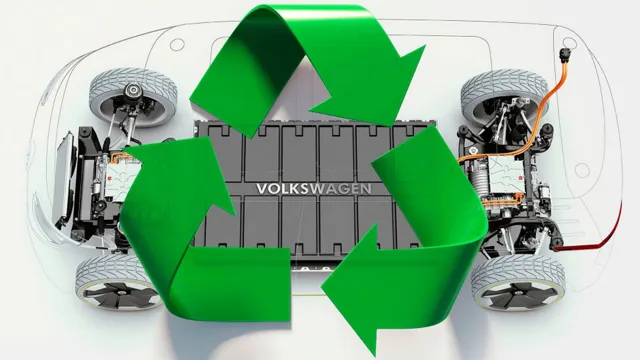Electric Car Battery Replacement: Understanding the Costs Involved
Have you noticed that your electric car’s battery doesn’t hold as much charge as it did when you bought it? It’s not uncommon for electric car batteries to lose their capacity over time, which can impact your car’s overall performance. Replacing your electric car’s battery may seem like an intimidating and costly process, but it’s important to know that it’s not as complicated as it may seem. In fact, it’s a common practice among electric car owners, and it can significantly extend the lifespan of your car.
Think of it like replacing a worn-out pair of shoes that you love. You don’t want to get rid of them, but you also don’t want them to hold you back. Here’s what you need to know about replacing your electric car’s battery.
Cost of a Battery Replacement
The cost to replace the battery in an electric car can vary greatly depending on the make and model of the vehicle. On average, a battery replacement can cost anywhere from $5,500 to $8,000. However, some luxury electric cars can have a battery replacement cost upwards of $20,000.
That being said, the cost of a battery replacement is not something that electric car owners need to worry about for at least 8-10 years. The lifespan of an electric vehicle’s battery can last anywhere from 100,000 to 200,000 miles before needing a replacement. And with advancements in battery technology in recent years, batteries are becoming more efficient and cost-effective.
So, while the cost of a battery replacement may seem steep, it’s important to remember that it’s a long-term investment in the longevity of your electric car.
Factors Affecting the Cost
The cost of a battery replacement depends on several factors that affect the overall price. Firstly, the type of battery required for your vehicle plays a significant role in determining the cost. Some vehicles require specific types of batteries that are more expensive than others, while others may need a simple, standard battery.
Secondly, the labor cost for replacing the battery can vary depending on the vehicle’s make and model, and the location. If your car’s battery is in a challenging location, it can take more time and effort to replace, increasing the labor cost. Thirdly, the brand and quality of the battery can also influence the total cost.
Opting for a cheaper battery may seem like a good idea, but it may not last as long as a higher quality battery, leading to additional replacement costs in the future. Finally, if you need additional repairs to your vehicle’s electrical system, that can add to the overall price. Ultimately, it’s essential to consider all these factors when getting a battery replacement to ensure you get the most value for your money.

Average Battery Replacement Cost by Car Brand
Replacing the battery in your car can be a daunting task, especially with the varying cost across different car brands. The average cost of a battery replacement ranges from around $100 to $350, depending on your car’s make and model. Generally, luxury brands such as BMW or Mercedes-Benz tend to have more expensive battery replacements compared to more affordable brands like Toyota or Honda.
It’s crucial to consider the battery’s quality and warranty when purchasing a replacement battery, as it can greatly impact the battery’s longevity and overall performance. Investing in a high-quality battery replacement may seem pricey upfront, but it can save you money in the long run by prolonging the battery’s lifespan and reducing the need for frequent replacements. Ultimately, it’s essential to do your research and determine which replacement battery option is the best fit for your car’s needs and your budget.
Ways to Extend Your Battery Life
Electric cars are becoming more popular nowadays, but some may worry about the cost to replace the battery. One way to avoid having to replace the battery too soon is to extend its life. Some ways to do this include monitoring and limiting excessive idling, avoiding extreme weather conditions (both hot and cold), and using accessories sparingly.
It’s also important to follow the manufacturer’s recommended maintenance schedule and use the right type of charger for the battery. Additionally, driving habits can also affect battery life, such as avoiding rapid acceleration and braking, driving at a moderate speed, and reducing the weight in the vehicle. All of these small adjustments can help prolong the life of the battery and potentially save on the cost of replacement in the long run.
Maintenance Tips
If you’re like most people, you rely heavily on your smartphone to stay connected with friends, family, and coworkers. Unfortunately, all that connectivity comes at a cost – your smartphone’s battery life. But don’t worry, there are several ways to extend the life of your battery, so you won’t have to charge up as frequently.
One of the best ways to do this is to adjust your phone’s settings. For example, you can reduce your screen brightness, turn off Bluetooth and Wi-Fi when you’re not using them, and put your phone on airplane mode when you’re not expecting any calls or texts. Another way to extend your battery life is to avoid overcharging your phone.
If you leave your phone plugged in after it’s fully charged, it can actually damage the battery and shorten its lifespan. So, try to unplug your phone once it reaches 100% or use a smart charger that automatically shuts off when your phone is fully charged. By following these simple tips, you can extend your battery’s life and stay connected for longer.
Charging Habits to Avoid
In today’s digital age, almost everyone is dependent upon their mobile devices for communication, entertainment, and work-related tasks. However, if you’re one of those people who constantly experience a drained battery, then it’s high time you examine your charging habits. While it’s true that modern smartphones have come a long way, the lithium-ion batteries they use are still susceptible to degradation over time.
One way to extend your battery life is to avoid charging your phone overnight, as it can lead to overheating and ultimately reduce your battery’s lifespan. Furthermore, using a non-certified charger or cable can be detrimental to your phone’s battery and overall safety. Instead, stick to your phone’s original charger and cable to ensure proper current and voltage regulation.
Last but not least, avoid using fast chargers all the time because, although they’re convenient, they’re known to generate too much heat and can shorten your battery’s life expectancy. By implementing these simple charging habits, you can optimize your phone’s battery life and prevent unnecessary replacement costs.
Usage Tips
Battery life can be a big concern for people who use their devices frequently. However, there are several ways to extend the battery life of your device. One simple way is to reduce the brightness of your screen.
Bright screens consume more battery power than dim ones. You can also turn off your Wi-Fi and Bluetooth connections when you’re not using them, as they are both battery drainers. Another useful tip is to close unused apps, as they can still drain the battery even when they’re not in use.
Additionally, enabling power-saving mode on your device can help maximize battery life. And lastly, avoid extreme temperatures, as batteries tend to weaken in extremely hot or cold environments. By following these easy tips, you can help ensure your device has a longer battery life, saving you the inconvenience of frequent charging.
Benefits of Investing in a New Battery
The cost to replace the battery in an electric car may seem daunting at first, but investing in a new battery has numerous benefits. Firstly, a new battery can extend the lifespan of your electric car. Over time, the older battery may not hold as much charge, which can lead to decreased performance and range.
A new battery can solve this issue and provide a longer lifespan for your vehicle. Additionally, a new battery can save you money in the long run. While the upfront cost of a new battery may be higher, you’ll save money on fuel and maintenance costs.
Electric cars do not require oil changes or other traditional maintenance tasks that come with gasoline-powered vehicles. Finally, a new battery can offer improved performance. Newer batteries often have better technology and higher energy density, which can provide faster acceleration and better overall performance.
So, while the cost to replace the battery in an electric car may seem significant, investing in a new battery can provide a range of benefits in terms of lifespan, cost-saving, and performance.
Increased Efficiency and Performance
Investing in a new battery can bring a variety of benefits, including increased efficiency and performance. Over time, older batteries can become less effective at providing power and may require more time to charge or may not hold a charge for as long. Upgrading to a new, high-quality battery can help to improve the performance and longevity of your device.
A new battery can also help to optimize the energy usage of your device, leading to longer battery life and faster charging times. By investing in a new battery, you can ensure that your device is operating at its best and is able to keep up with your needs. Whether you’re using your device for work or play, a new battery can make a huge difference in the overall performance and efficiency of your device.
So, if you’re looking to boost your device’s productivity and get the most out of your technology, investing in a new battery may be a smart choice.
Long-Term Savings on Maintenance and Fuel Costs
Investing in a new battery for your vehicle can offer numerous benefits, including long-term savings on maintenance and fuel costs. While the upfront cost of a new battery may seem daunting, it is important to consider the cost savings over time. A new battery can provide a more consistent source of power for your vehicle, reducing the stress on the engine and transmission.
As a result, you can expect less wear and tear on these critical components, which can translate to fewer repairs and replacements down the road. Additionally, a new battery can also improve fuel efficiency by reducing the amount of energy that is lost during the charging and discharging process. This means that you can save money on fuel over time, as well as reduce your carbon footprint.
Overall, investing in a new battery is a smart choice for anyone looking to save money and maintain their vehicle’s performance over the long term.
Final Thoughts
When it comes to the cost of replacing the battery in an electric car, it’s important to keep in mind that it varies depending on the make and model of the vehicle. On average, the cost can range anywhere from $3,000 to $7,000, with some luxury brands costing even more. However, it’s important to note that you may not need to replace the battery for the life of the car, as many electric vehicles come with warranties that cover the battery for up to 8 years or 100,000 miles.
Additionally, advancements in battery technology are making them more durable and efficient, which could lead to longer lifetimes and lower costs down the line. So while the cost to replace the battery may seem daunting, it’s important to weigh the long-term benefits and savings of driving an electric car.
Conclusion
In the world of electric cars, the battery is the heartbeat that keeps the vehicle running smoothly. However, the cost of replacing this essential component can be a shock to your wallet. So, while an electric car may save you money on gas, it’s important to factor in the potential cost of a battery replacement.
After all, you wouldn’t want to be left stranded on the side of the road with a dead battery and an even deader bank account!”
FAQs
What is the average cost to replace the battery in an electric car?
The cost to replace the battery in an electric car can vary, but it’s typically between $3,000 and $5,000.
How often do electric car batteries need to be replaced?
The lifespan of an electric car battery can vary, but they usually last between 8 and 10 years. After that, they may need to be replaced.
Can you replace an electric car battery yourself?
It’s not recommended to replace an electric car battery yourself, as it can be dangerous and requires specialized knowledge and equipment. It’s best to have a professional do it.
Is the cost to replace an electric car battery covered under warranty?
It depends on the car manufacturer and the specific warranty. Some warranties may cover the cost to replace the battery, while others may not. It’s important to check with the manufacturer for details.





